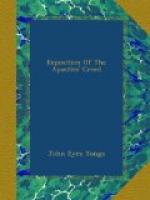The descent into hell is not referred to in the Westminster Confession, but in the Larger Catechism this statement is found: “Christ’s humiliation after His death consisted in His being buried, and continuing in the state of the dead, and under the power of death, till the third day, which hath been otherwise expressed in these words, ’He descended into hell’"[120] What the Westminster Divines meant was, that while Christ’s body was laid in the grave His spirit passed from the visible to the invisible world, that, as He shared the common lot of men in the death and burial of His body, so He shared their common lot in passing as a spirit into the abode of spirits. The statement of this clause follows naturally what is said of the body of Jesus in that which precedes it. As His body was crucified, dead, and buried, so His spirit passed into the abode of spirits. “In all things it behoved him to be made like unto His brethren."[121]
Those who maintain that the spirit of Christ descended into hell in a sense peculiar to Himself, ground their opinion upon certain passages of Scripture. Psalm xvi. 10—“Thou wilt not leave my soul in hell, nor wilt thou suffer thine Holy One to see corruption”—is quoted in support of this opinion, but does not really justify it. It expresses the confidence of the speaker, that God will not deliver His soul to the power of Sheol (the Hebrew word equivalent to the Greek Hades), or suffer His body to see corruption, and in this sense the passage is quoted by Peter, as a proof from prophecy of the resurrection of Christ. Ephesians iv. 9 is also regarded as giving sanction to this view—“Now that he ascended, what is it but that he also descended first into the lower parts of the earth?” By the “lower parts of the earth” some understand parts lower than the earth, but such a view rests on a strained interpretation of the passage. Paul’s argument is that ascent to heaven must have been made by one who, before ascending, was below. Christ had come down from heaven to earth, and was below therefore, he argues, Christ is the subject of the prophecy he has quoted. He it was that hid ascended up on high, not the Father, who is everywhere.[122]
In Isaiah xliv. 23 we have corroboration of this view: “Sing, O ye heavens ... shout, ye lower parts of the earth.” Here “lower parts” means simply the earth beneath; that is, beneath the heavens.
The most difficult and important passage bearing on the clause is 1 Peter iii. 18, 19. “Being put to death in the flesh, but quickened by the spirit by which also he went and preached to the spirits in prison.” In the Revised Version the rendering is not “by” but “in,” “which” referring to the word “spirit,”—not the third Person of the Godhead, but the human spirit of Jesus—in which spirit, separated from the body yet instinct with immortal life, He went and “preached to the spirits in prison,” or rather to the spirits in custody. The passage marks an antithesis between “flesh” and “spirit.” In Christ’s “flesh.” He was put to death. His enemies killed His body, but His soul was as beyond their power. His body was dead, but in the abode of souls His “spirit” was alive and active.




